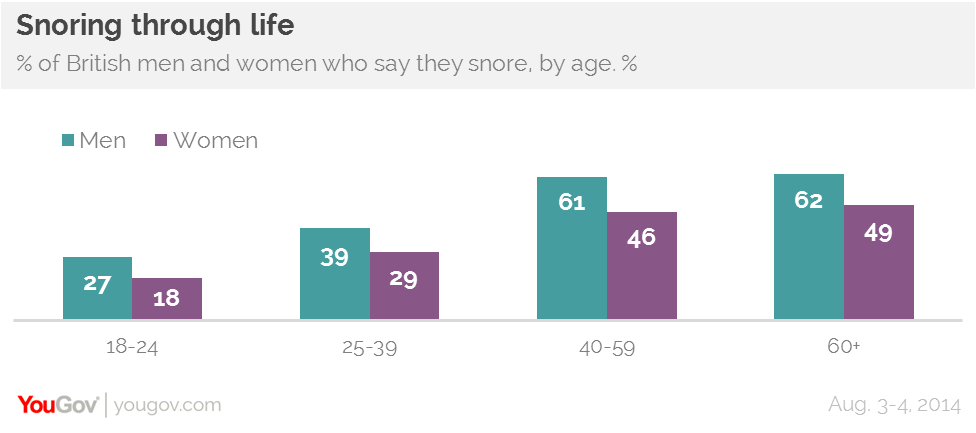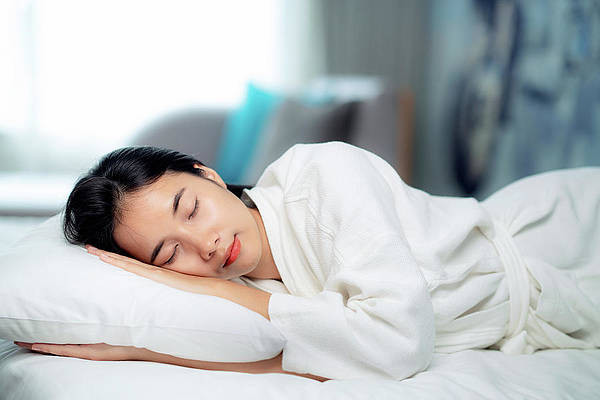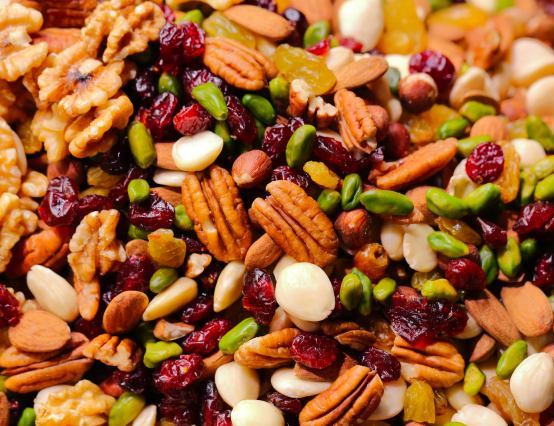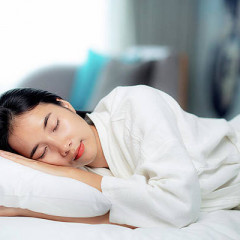
Whether you’re the snorer or the partner with a pillow over your ears, snoring can easily disrupt a good nights sleep. With recent figures from British Snoring & Sleep Apnea Association estimates that over 40% of the UK population currently suffer from the condition, this common sleeping difficulty is causing nighttime disturbance all over the country.

(Source: YouGov)
As we embark on Stop Snoring Week 2021, it’s time to take your sleep schedule into your own hands and improve your sleeping habits for a more well-rested future. Whether you’re striving to stop snoring or struggling with noise-induced insomnia, we have you covered with our 3 sleep hacks, guaranteed to save your snooze.
How Can Snoring Affect Your Health?
Commonly known as a noisy inconvenience, the health ramifications of repeated snoring are easily forgotten and ignored amongst the population. Whether you’re a frequent snorer or suffer from more severe forms of sleep apnea, this sleeping hindrance may leave you prone to future health concerns when left untreated.
Heart Disease
As both snoring and sleep apnea are often linked to obesity or new weight gain, they are commonly associated with a rise in blood pressure and poor cholesterol health. If you find that you’re snoring more often than not, you could be at a greater risk of cardiovascular conditions such as coronary artery disease or a heart attack. Sleep apnea sufferers also have an increased risk of arrhythmia as prolonged periods of inactive breathing puts pressure on the heart rhythm, causing conditions such as atrial fibrillation.
To combat this, we recommend consulting your specialist about introducing a CPAP (continuous positive airway pressure) machine into your sleeping routine. As a sleeping aid, this machine reduces snoring and ensures you are taking strong and structured breaths to reduce heart arrhythmia.
Stroke
If you have been snoring for a prolonged period of time you may also be at risk of suffering a stroke in later life. Excessive snoring and sleep apnea causes an increase in fatty plaque deposits that narrow important arteries.
As carotid arteries begin to block, extensive plaque build-up contributes to stroke risk.
Insomnia
The ongoing effects of snoring not only affect the health of the sufferer but often other members of the household. The World Health Organisation (WHO) claim that a successful night’s sleep is a basic requirement for maintaining good health.
Snoring induced insomnia can lead to a future of mental health consequences, caused by lack of rest. Being subjected to loud noise at night can disrupt regular sleeping patterns, therefore placing a negative impact on the body’s physical health. From poor hormonal release to weakened cardiovascular function, lack of sleep can lead to a future of health problems.
How To Improve Your Sleeping Habits
As conditions such as snoring and sleep apnea continue to remain a long term sleeping ailment for many, it’s time to take charge of your own sleeping schedule and swap the sleepless nights for a well-rested slumber. We have collated our 3 favourite snore blocking sleeping hacks, guaranteed to leave you feeling well-rested in the morning.
Exercise During The Day
If you’re trying to reduce your snoring and alleviate symptoms of sleep apnea, exercise is an important must-have to add to your daily routine. Regular exercise not only speeds up the metabolism, burning the weight associated with snoring but increases your levels of deep restorative sleep. When we fall into a deep slumber, snoring is reduced, allowing our bodies to rest peacefully.
People who exercise daily are also more likely to see powerful benefits if they struggle with insomnia. Structured light exercise can improve sleep quality when practised in the morning or early afternoon as it decreases muscle tension, stress and energy levels, setting your body up for a well-earned rest.
Swap The Screen
A 2011 sleep poll from The National Sleep Foundation found that 6 in 10 of us are guilty of using a laptop or smartphone within one hour before going to bed. Known for emitting blue light that decreases our feelings of sleepiness, using a screen in the evening can seriously affect your REM sleep quality.
If you’re looking to adopt a deeper slumber pattern, swapping the screen for a book before bed could be the simplest path towards a positive snoozing experience.
However, if you’re an evening worker, or like most of us, addicted to your smartphone, fear not. Blue light glasses can help reflect the sleep deprevating glare associated with our beloved smartphones and can be easily purchased online for a late-night tech session.
Change Up Your Sleeping Environment
Nothing screams a good nights sleep like a peaceful sleeping environment. If you’re someone who struggles to get to sleep, simple changes to your surroundings could make all the difference.
Make your bed you calm space by eliminating stressful associations. To wind down successfully, only use your bed for relaxing into slumber. Those of you who work from home should refrain from curling up under the covers during the day, leaving your bed as an inviting sanctuary, purely for evening relaxation.
Making sure your bedroom is cool and quiet is also proven to improve sleep quality. According to the Sleep Foundation, for a successful slumber, the room temperature should be approximately 65 degrees Fahrenheit (18.3 degrees Celsius) for optimal comfort.
Still Struggling To Sleep?
If you’re still struggling with snoring or a sleep-related issue, it’s always best to consult a specialist about your sleeping habits and concerns. As the BSSAA states, “nobody need suffer as a result of snoring, it is a condition that can be treated”. Working on your own sleeping routine is the first step towards a healthier and well-rested future.










0 Comments